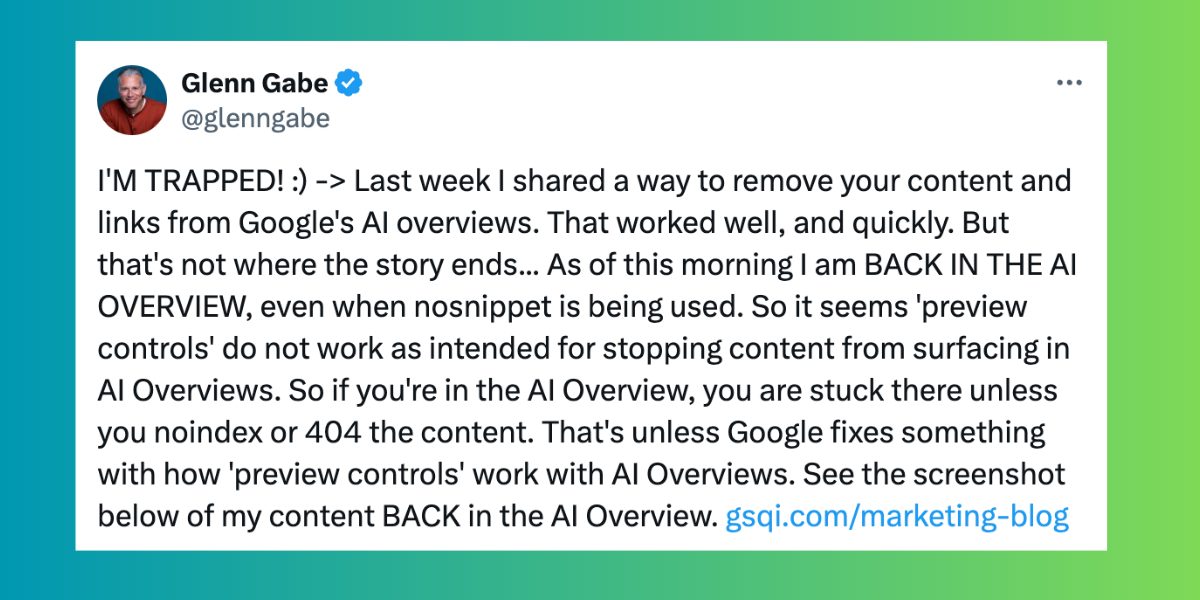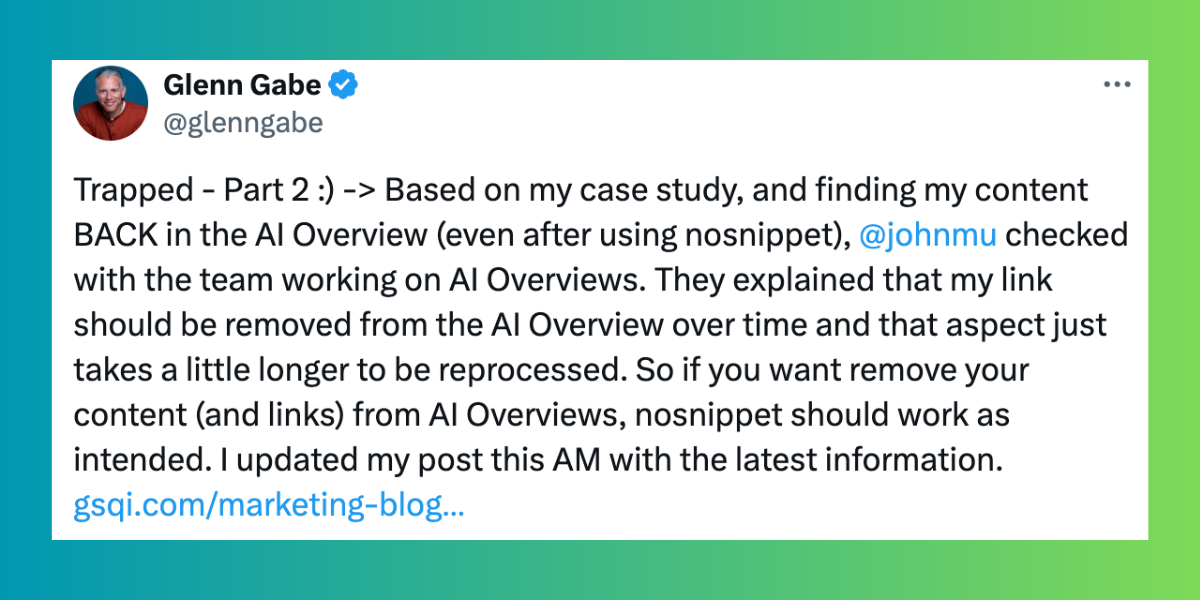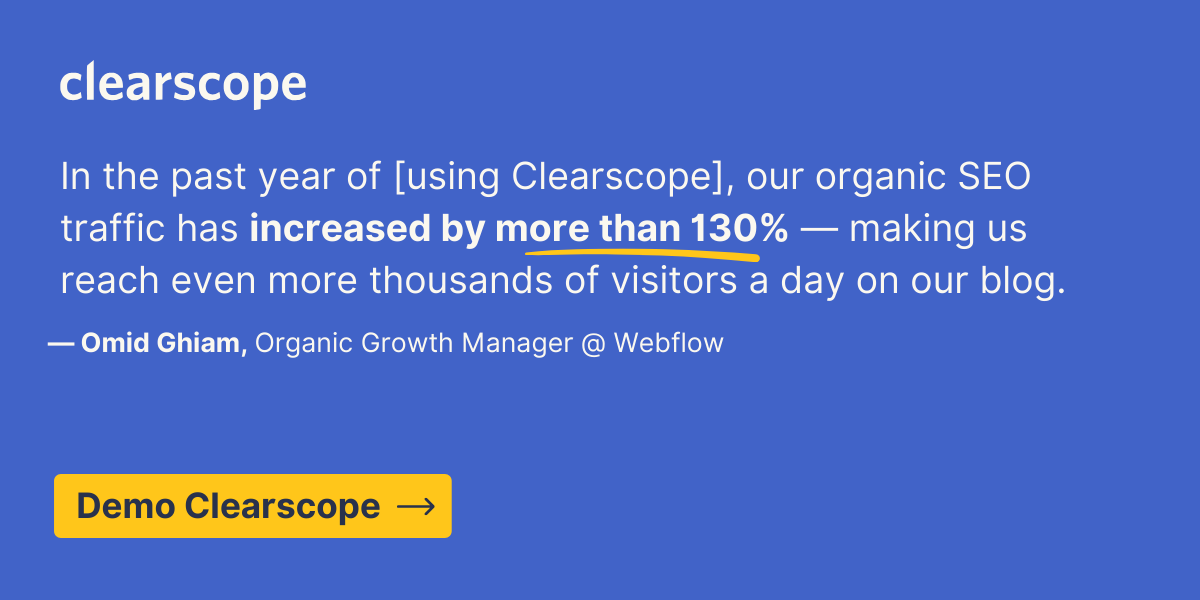Can You Stop Google From Showing Your Content in AI Overviews? Should You?
Topic: AI Content
Published:
Written by: Bernard Huang
If you’re asking if you should keep your content from showing up in AI Overviews, you’re not alone.
Many search marketing and content pros are asking the same thing.
You could stop Google from displaying your content in AI overviews—or from crawling your content entirely—but these actions could defeat much of the goals behind your content marketing and SEO efforts.
But there are some instances where you may want to consider doing so (more on that below).
How to keep your content out of Google's AI Overviews
According to Kevin Indig in his May 20, 2024, issue of The Growth Newsletter, “You can’t really opt-out of [Google’s AI Overviews, or AIOs]…. You can use a nosnippet meta tag but cripple yourself in the process because you also lose your description and rich snippets.”
The nosnippet meta tag is an instruction that tells search engines not to display a summary snippet for a particular webpage in search results.
But what does it do exactly if you use it on your site?
The nosnippet meta tag would successfully block Google’s AI Overviews, but it also blocks:
Standard text snippets on search engine result pages (SERPs)
Video previews
Google Discover
Yikes.
Blocking these summaries or search result features could also reduce your click-through rates, so you could see a significant traffic decline.
(According to a 2024 study by FirstPageSage, featured snippets have the highest click-through rate of any Google SERP element at 42.9%.)
And most sites don’t want to lose those click-through opportunities.
Top reasons why you might want to use the nosnippet meta tag
So, even though it might reduce your chances of a click-through to be eliminated from these SERP features, there may be legitimate reasons to use the nosnippet meta tag, including:
You don’t want landing pages designed for a CTA or sales functions to be misrepresented in the SERP
You want complete control over the content that’s shown to people before they click to have strong controls over your brand
You’re taking extra steps to prevent content scraping of your site, and to you and your team, it’s worth the risk of a lower CTR or decreased brand visibility
You need to protect sensitive or proprietary information from being scraped or misrepresented, but it still needs to be available to your target audience publicly
You’ve got a KILLER copywriter and SEO team, and you want to users to focus on those well-crafted page titles and specific URLs in a strategy to create intrigue
And here’s the most compelling reason to do so:
It will better serve your human target audience overall.
For example, if the content on the page is complex and technical—or regularly changing (think updating hourly, daily, or even every week)—allowing Google to automatically generate an unhelpful featured snippet or AI Overview from the material might not be in the reader's best interest.
And this means you’re preventing Google from concocting a snippet that could be unhelpful or even misleading to searchers.
If you add the nosnippet meta tag to your content, it could take some time before you see results. As in the case of Glenn Gabe's experiment below.

Glenn Gabe's Part 1 + 2 posts illustrate the delays in pulling your content AI Overviews. Tap to read the full original post.

Glenn Gabe's Part 1 + 2 posts illustrate the delays in pulling your content AI Overviews. Tap to read the full original post.
All this being said, unless you have a very strong case for using the nosnippet meta tag action—or a unique strategy that makes the risk of lower click-throughs or impressions worth it—it’s not a route I would recommend in my professional experience.
Why?
Because building brand-name awareness through more visibility in featured snippets or AI Overviews, whether URLs are clicked-through by your users or not, is not something you should give up without a very good reason.
But ultimately, as with everything in SEO, it truly depends.
If your brand is familiar and your site SEO is healthy, strongly owns your target topic, and ranks highly regularly across all your targeted search intents, you may have less risk in decreased visibility or CTRs by using the nosnippet meta tag.

Feature photo by Solen Feyissa on Unsplash.
Information Gain in SEO: The Guide to Convincing Yourself, Team, and Clients to Rethink Current Strategies
What is information gain? Why is everyone talking about it? This is the guide you need to persuade yourself, your team, and your clients to reassess your current strategy to include info gain in your content.
Read moreCan You Copyright Your AI Generated Content?
I was curious: Who owns AI-generated content? Can it be copyrighted? Here’s what I discovered.
Read moreContent Optimization Strategy: 20 Tips to Drive Leads and Traffic
Discover how to create a content optimization strategy that drives more organic traffic and generates qualified business leads for your sales funnel.
Read more